Newsletter - Summer 2012

University of California Board of Regents Approve UC Irvine School of Education
July 18, 2012, San Francisco, California
In approving the establishment of the UC Irvine School of Education from the existing Department of Education, the University of California Board of Regents cited:
"Internationally-Recognized Faculty"
"Quality and Breadth of Research"
"Academic Rigor"
"Robust External Funding"
"Active and Broad Engagement with the Community"
July 18, 2012, San Francisco, California
In approving the establishment of the UC Irvine School of Education from the existing Department of Education, the University of California Board of Regents cited:
"Internationally-Recognized Faculty"
"Quality and Breadth of Research"
"Academic Rigor"
"Robust External Funding"
"Active and Broad Engagement with the Community"
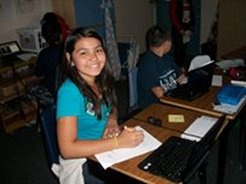 Photo by Lisa Roberts
Photo by Lisa Roberts
Laptop Intervention Closes Gaps in Academic Achievement
Responding to concern over the growing gap in academic achievement between English learners and other at risk students and their peers, Professors Mark Warschauer, Penelope Collins, and George Farkas, assisted by Ph.D. students Binbin Zheng and Jin Kyoung Hwang, studied a technology-based intervention in a California school district designed to close this gap.
With funding from the National Science Foundation, the research team followed the progress of 1,000 fifth- and sixth-grade students, half of whom received laptop computers and specialized software to foster improved science learning through interaction and writing, and half in a control group that received regular science instruction.
The study found that the intervention was highly successful in closing gaps between at-risk learners, whether considering language status, income group, or ethnic group, and their peers. Similar results were found when comparing scores of low-income students or Hispanic students with those of their peers. These benefits in science learning were closely tied to improved writing with laptops. Students in the laptop group wrote longer and better essays on scientific topics than did students in the control group.
Responding to concern over the growing gap in academic achievement between English learners and other at risk students and their peers, Professors Mark Warschauer, Penelope Collins, and George Farkas, assisted by Ph.D. students Binbin Zheng and Jin Kyoung Hwang, studied a technology-based intervention in a California school district designed to close this gap.
With funding from the National Science Foundation, the research team followed the progress of 1,000 fifth- and sixth-grade students, half of whom received laptop computers and specialized software to foster improved science learning through interaction and writing, and half in a control group that received regular science instruction.
The study found that the intervention was highly successful in closing gaps between at-risk learners, whether considering language status, income group, or ethnic group, and their peers. Similar results were found when comparing scores of low-income students or Hispanic students with those of their peers. These benefits in science learning were closely tied to improved writing with laptops. Students in the laptop group wrote longer and better essays on scientific topics than did students in the control group.
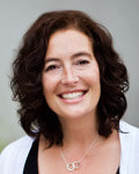
Presents at International Conference of Community Psychology in Barcelona, Spain
Stephanie ReichAssistant Professor Stephanie Reich participated in the International Conference of Community Psychology in Barcelona, Spain, June 21-23, where she presented findings from her research conducted in collaboration with Associate Professor of Education Rebecca Black and doctoral students Ksenia Korobkova (Education) and Mariya Sumaroka (Psychology and Social Behavior). The 2012 conference theme was "Community Psychology in a World in Crisis." The title of Professor Reich's symposium presentation was "Children's Bypassing Site Design to Establish Communities."
Abstract
An increasing amount of research is exploring the characteristics of online communities. The bulk of these studies identify how people feel about their communities and how they are able to form connections in virtual spaces that often have unclear boundaries. What is missing in these inquiries is an appreciation of the potentially restrictive aspects of the sites in which these interactions occur. Many online communities that are formed through social networking sites and virtual worlds have design features that establish the normative behaviors of the site and shape how users are able to interact. These sites have more restrictive communication features when users are young, as children are considered more at-risk for predators and bullies. Using data from an in-depth content analysis of several popular virtual worlds for children (e.g., Club Penguin, Webkinz), our presentation describes the creative ways in which children establish subcultures, connections, and communities when programming choices and interface designs discourage and/or limit user interactions.
Stephanie ReichAssistant Professor Stephanie Reich participated in the International Conference of Community Psychology in Barcelona, Spain, June 21-23, where she presented findings from her research conducted in collaboration with Associate Professor of Education Rebecca Black and doctoral students Ksenia Korobkova (Education) and Mariya Sumaroka (Psychology and Social Behavior). The 2012 conference theme was "Community Psychology in a World in Crisis." The title of Professor Reich's symposium presentation was "Children's Bypassing Site Design to Establish Communities."
Abstract
An increasing amount of research is exploring the characteristics of online communities. The bulk of these studies identify how people feel about their communities and how they are able to form connections in virtual spaces that often have unclear boundaries. What is missing in these inquiries is an appreciation of the potentially restrictive aspects of the sites in which these interactions occur. Many online communities that are formed through social networking sites and virtual worlds have design features that establish the normative behaviors of the site and shape how users are able to interact. These sites have more restrictive communication features when users are young, as children are considered more at-risk for predators and bullies. Using data from an in-depth content analysis of several popular virtual worlds for children (e.g., Club Penguin, Webkinz), our presentation describes the creative ways in which children establish subcultures, connections, and communities when programming choices and interface designs discourage and/or limit user interactions.
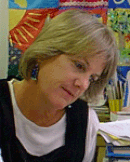
Teaching Elementary School Students to be Effective Writers Available from IES (Institute of Education Sciences)
Associate Professor Carol Booth Olson, Director of the UC Irvine Writing Project, is a member of the team that authored the new Institute of Education Sciences publication Teaching Elementary School Students to be Effective Writers. Created as an educator's practice guide, the publication is geared toward teachers, literacy coaches, and other educators who want to improve the writing of their elementary students.
As explained in the introduction, "The goal of this practice guide is to offer educators specific, evidence-based recommendations that address the challenge of teaching writing in the elementary school. The guide provides practical, clear information on ciritical topics related to teaching writing and is based on the best available evidence as judged by the authors."
There are four areas of recommendations in Teaching Elementary School Students to be Effective Writers, each supported by activities and strategies that educators can use to increase writing achievement for elementary students:
Associate Professor Carol Booth Olson, Director of the UC Irvine Writing Project, is a member of the team that authored the new Institute of Education Sciences publication Teaching Elementary School Students to be Effective Writers. Created as an educator's practice guide, the publication is geared toward teachers, literacy coaches, and other educators who want to improve the writing of their elementary students.
As explained in the introduction, "The goal of this practice guide is to offer educators specific, evidence-based recommendations that address the challenge of teaching writing in the elementary school. The guide provides practical, clear information on ciritical topics related to teaching writing and is based on the best available evidence as judged by the authors."
There are four areas of recommendations in Teaching Elementary School Students to be Effective Writers, each supported by activities and strategies that educators can use to increase writing achievement for elementary students:
- Provide daily time for students to write.
- Teach students to use the writing process for a variety of purposes.
- Teach student to become fluent with handwriting, spelling, sentence construction, typing and work processing.
- Create an engaged community of writers.

A Collection of Foundational Readings for Deep Consideration
Responding to a concern that teacher credential candidates may experience excellent courses but miss the connections between courses, the School of Education, with a grant from the Schools First Credit Union, created A Collection of Foundation Readings for Deep Consideration.
In a process that took place over several months, Director of Teacher Education Judi Conroy led a group of faculty in the selection of readings representative of the important strands of knowledge and practice in the teacher credential program. At the end of spring, the selected readings were compiled into the new publication A Collection of Foundation Readings for Deep Consideration.
Commenting upon the criteria for inclusion, Dr. Conroy explained,
The readings have been selected to help faculty and students achieve deeper understanding about the cross threads of the program—those critical connections that bring knowledge into vivid focus – and the program’s six important strands of knowledge and practice.
A Collection of Foundation Readings for Deep Consideration is required reading for the UC Irvine teacher credential program, and each of the selected readings will be a topic of discussion in a course during the program. The publication is available at the UC Irvine Bookstore.
Responding to a concern that teacher credential candidates may experience excellent courses but miss the connections between courses, the School of Education, with a grant from the Schools First Credit Union, created A Collection of Foundation Readings for Deep Consideration.
In a process that took place over several months, Director of Teacher Education Judi Conroy led a group of faculty in the selection of readings representative of the important strands of knowledge and practice in the teacher credential program. At the end of spring, the selected readings were compiled into the new publication A Collection of Foundation Readings for Deep Consideration.
Commenting upon the criteria for inclusion, Dr. Conroy explained,
The readings have been selected to help faculty and students achieve deeper understanding about the cross threads of the program—those critical connections that bring knowledge into vivid focus – and the program’s six important strands of knowledge and practice.
- Learning, Cognition, and Development
- Learning to Learn from Teaching
- Language, Literacy, and Technology
- Equity and Sociocultural Contexts
- Caring and Ethics
- Pedagogical Content Knowledge
A Collection of Foundation Readings for Deep Consideration is required reading for the UC Irvine teacher credential program, and each of the selected readings will be a topic of discussion in a course during the program. The publication is available at the UC Irvine Bookstore.
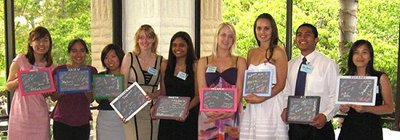
UC Irvine Cal Teach Science and Mathematics Program Honors First Cohort of 4-Year Bachelor of Science with Teacher Credential Graduates
At the University Club on June 9th, the UC Irvine Cal Teach Science and Math Program honored the first cohort of students to receive both their bachelor of science degree and their California single subject teacher credential in the special four-year degree program sponsored jointly by the Schools of Biological Sciences, Physical Sciences, and Education.
The Cal Teach program, created in reponse to the critical shortage of qualified middle and high school math and science teachers throughout the state, is designed to offer undergraduates opportunities to explore math and science teaching as a career option. A total of 107 undergraduates enrolled in the gateway course for the Cal Teach program during the 2011-2012 academic year. By spring 2012, 36 freshmen and sophomores had declared their majors in either math or science plus the California Teacher Credential. Twenty-two four-year combined B.S. plus California Teacher Credential graduates are expected to complete their degree requirements by June 2013. Next academic year, 2012-2013, for the first time students will be able to enroll in a new major - B.S. in Biology plus California Teacher Credential; at least 70 incoming students have registered for this option for fall 2012.
At the University Club on June 9th, the UC Irvine Cal Teach Science and Math Program honored the first cohort of students to receive both their bachelor of science degree and their California single subject teacher credential in the special four-year degree program sponsored jointly by the Schools of Biological Sciences, Physical Sciences, and Education.
The Cal Teach program, created in reponse to the critical shortage of qualified middle and high school math and science teachers throughout the state, is designed to offer undergraduates opportunities to explore math and science teaching as a career option. A total of 107 undergraduates enrolled in the gateway course for the Cal Teach program during the 2011-2012 academic year. By spring 2012, 36 freshmen and sophomores had declared their majors in either math or science plus the California Teacher Credential. Twenty-two four-year combined B.S. plus California Teacher Credential graduates are expected to complete their degree requirements by June 2013. Next academic year, 2012-2013, for the first time students will be able to enroll in a new major - B.S. in Biology plus California Teacher Credential; at least 70 incoming students have registered for this option for fall 2012.
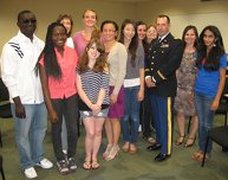
School Honors Students Who Earned Certificate in After School Education (CASE)
On June 14, the Director of Undergraduate Education Sue Marshall hosted a recognition ceremony for those 2012 undergraduates who had completed requirements and earned their Certificate in After School Education (CASE). The certificate, the first of its kind in the nation, is designed to address the educational gap that exists between the impact that well-trained after-school staff can have on program quality and the lack of formal training opportunities generally available to after-school staff.
To earn a certificate, undergraduates must complete a minimum of five courses totaling 20 quarter units along with a minimum of 70 hours of field experience. For field experience opportuities, the School of Education partners with local after-school sites including Girls, Inc., Adams Elementary School (THINK Together site), College Park Elementary (Project Success site), Sepulveda Elementary (THINK Together site), Turtle Rock Elementary, and UC Irvine Extended Day.
During this past year, CASE program participants contributed over 1,400 hours of service to local after school sites.
On June 14, the Director of Undergraduate Education Sue Marshall hosted a recognition ceremony for those 2012 undergraduates who had completed requirements and earned their Certificate in After School Education (CASE). The certificate, the first of its kind in the nation, is designed to address the educational gap that exists between the impact that well-trained after-school staff can have on program quality and the lack of formal training opportunities generally available to after-school staff.
To earn a certificate, undergraduates must complete a minimum of five courses totaling 20 quarter units along with a minimum of 70 hours of field experience. For field experience opportuities, the School of Education partners with local after-school sites including Girls, Inc., Adams Elementary School (THINK Together site), College Park Elementary (Project Success site), Sepulveda Elementary (THINK Together site), Turtle Rock Elementary, and UC Irvine Extended Day.
During this past year, CASE program participants contributed over 1,400 hours of service to local after school sites.
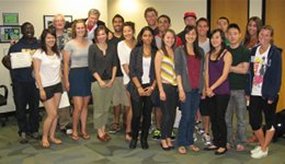
School Thanks 72 Peer Assistants for 2011-2012 Service
At the end of spring quarter, the School of Education presented certificates of appreciation and UCI pins to the 72 Peer Assistants who served as instructor assistants during the 2011-2012 academic year. Peer Assistants are undergraduate volunteers who, having achieved high performance in an education class, are competitively selected to assist in a subsequent offering of the course. During the quarter the Peer Assistant supports the instructor and the teaching assistant by leading group discussions, holding office hours and study sessions, helping prepare materials, and completing related tasks to ensure high quality course delivery.
Peer Assistants volunteer an average of 90-100 hours per quarter. This past academic year, the 72 Peer Assistants contributed 90 quarters of support to 10 instructors: Professors Mark Warschauer and Rossella Santagata; Lecturers Shane Goodridge, Susan Guilfoyle, Joseph Jenkins, Jeff Johnston, Jeanne Stone, and Tim Tift; and Teaching Associates Paul Rama and Shelly VanAmburg.
At the end of spring quarter, the School of Education presented certificates of appreciation and UCI pins to the 72 Peer Assistants who served as instructor assistants during the 2011-2012 academic year. Peer Assistants are undergraduate volunteers who, having achieved high performance in an education class, are competitively selected to assist in a subsequent offering of the course. During the quarter the Peer Assistant supports the instructor and the teaching assistant by leading group discussions, holding office hours and study sessions, helping prepare materials, and completing related tasks to ensure high quality course delivery.
Peer Assistants volunteer an average of 90-100 hours per quarter. This past academic year, the 72 Peer Assistants contributed 90 quarters of support to 10 instructors: Professors Mark Warschauer and Rossella Santagata; Lecturers Shane Goodridge, Susan Guilfoyle, Joseph Jenkins, Jeff Johnston, Jeanne Stone, and Tim Tift; and Teaching Associates Paul Rama and Shelly VanAmburg.
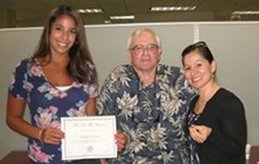 Jennifer Driver, Tim Tift, & Gisela Verduzco
Jennifer Driver, Tim Tift, & Gisela Verduzco
During the recognition ceremony Jennifer Driver was presented with the Tim Tift Peer Assistant Award for Extraordinary Service for the number of times she served as a peer assistant and the quality of her service. Ms. Driver first served as a peer assistant for Mr. Tift ("Coach T") when she was a freshman. Over the next four years, until she graduated this June, she served as a Peer Assistant each year, advancing to Lead Peer Assistant her senior year.
The Peer Assistant program was introduced to the then-Department of Education by Mr. Tim Tift in 2008 (2009 article).
The Peer Assistant program was introduced to the then-Department of Education by Mr. Tim Tift in 2008 (2009 article).

School Staff Volunteer at Orange County Fair
On Wednesday, July 18, the Orange County Fair opened its gates for ~5,000 developmentally disabled children and adults. Staff members of the UC Irvine School of Education were on hand to welcome fairgoers and ensure that all were walked safely into the park. During the morning SoE volunteers gave out fruit rolls, helped push wheelchairs for those needing assistance, and provided aid to people needing directions or help finding friends and relatives.
The Orange County Fair, a month-long event from July 13 through August 12, features entertainment, competitions, exhibits, rides, and an assortment of food options. The Fair traces its history to 1890.
Staff members assistance on July 18 is just one example of the many activities that faculty and staff pursue during the year as part of their commitment to the University of California mission to provide education, research, and service to the community.
On Wednesday, July 18, the Orange County Fair opened its gates for ~5,000 developmentally disabled children and adults. Staff members of the UC Irvine School of Education were on hand to welcome fairgoers and ensure that all were walked safely into the park. During the morning SoE volunteers gave out fruit rolls, helped push wheelchairs for those needing assistance, and provided aid to people needing directions or help finding friends and relatives.
The Orange County Fair, a month-long event from July 13 through August 12, features entertainment, competitions, exhibits, rides, and an assortment of food options. The Fair traces its history to 1890.
Staff members assistance on July 18 is just one example of the many activities that faculty and staff pursue during the year as part of their commitment to the University of California mission to provide education, research, and service to the community.
 Michael E. Martinez
1956-2012
Michael E. Martinez
1956-2012
University Honors Life and Work of Professor Michael E. Martinez: 1956-2012
On June 8, friends, fellow educators, community representatives, and family members gathered in the Pacific Ballroom to honor the life and work of Professor Michael E. Martinez, who passed away on April 5. The afternoon included tributes from fellow professors, university administrators, current and former students, and representatives from outside educational institutions. Professor Martinez was remembered as a colleague, mentor, advisor, teacher, administrator, researcher, and friend. (The family has requested that those who wish to honor Professor Martinez’s memory can contribute to the Michael E. Martinez Prize for Outstanding Education Research by a Doctoral Student at the University of California Irvine: http://www.uadv.uci.edu/MichaelEMartinezMemorialFund. Donations may also be sent to: Michael E. Martinez Prize, c/o Carolyn Canning-White, UCI Advancement, 100 Theory, Suite 250, Irvine, CA 92617.)
On June 8, friends, fellow educators, community representatives, and family members gathered in the Pacific Ballroom to honor the life and work of Professor Michael E. Martinez, who passed away on April 5. The afternoon included tributes from fellow professors, university administrators, current and former students, and representatives from outside educational institutions. Professor Martinez was remembered as a colleague, mentor, advisor, teacher, administrator, researcher, and friend. (The family has requested that those who wish to honor Professor Martinez’s memory can contribute to the Michael E. Martinez Prize for Outstanding Education Research by a Doctoral Student at the University of California Irvine: http://www.uadv.uci.edu/MichaelEMartinezMemorialFund. Donations may also be sent to: Michael E. Martinez Prize, c/o Carolyn Canning-White, UCI Advancement, 100 Theory, Suite 250, Irvine, CA 92617.)
Ph.D. Students' Summer Activity Highlights
Ph.D. in Education students are using the summer months to advantage. Students who completed their first year of study are finalizing their poster presentations for public showing during the September 28 Poster Presentation Session. Students who completed their second year of study are putting the finishing touches on their Second Year Research Paper, while students who have completed three years of doctoral work are preparing their Third Year Theme Paper benchmark for submission by September 15. Students in their fourth and fifth years are working on their doctoral research, proposal defense documents, and final defense dissertation.
Ph.D. student are continuing to ready their research findings for publication and are presenting at summertime conferences. Tara Barnhart has published Understanding National Board Certification with colleagues Mark Ellis and Leslee Milch. Cathy Tran published in Science: "U.S. Students Know What, But Not Why" and presented at the Games+Learning+Society Conference in Madison, Wisconsin: "Applying Motivation Theories to the Design of Educational Technology." Jin Kyoung Hwang presented at the Society for Scientific Study of Reading in Montreal: "Exploring the Writing Patterns of Elementary School Students as a Function of Their Proficiency in English." Cathery Yeh is working on the program committee for the National Council of Teachers of Mathematics (NCTM) 2012 Regional Conference in Hartford, Connecticut, and on the equity committee for the California Mathematics Council-South (CMC-S) Annual Conference in Palm Springs. Chenoa Woods and Dan Flynn are among the 50 fellows from across the U.S. participating in the Association for Institutional Research's National Data Institute in Washington, D.C.: "Using Federal Data to Support Research on Science, Engineering, and Postsecondary Education." (Students are pictured below in order of mention above.)
Ph.D. in Education students are using the summer months to advantage. Students who completed their first year of study are finalizing their poster presentations for public showing during the September 28 Poster Presentation Session. Students who completed their second year of study are putting the finishing touches on their Second Year Research Paper, while students who have completed three years of doctoral work are preparing their Third Year Theme Paper benchmark for submission by September 15. Students in their fourth and fifth years are working on their doctoral research, proposal defense documents, and final defense dissertation.
Ph.D. student are continuing to ready their research findings for publication and are presenting at summertime conferences. Tara Barnhart has published Understanding National Board Certification with colleagues Mark Ellis and Leslee Milch. Cathy Tran published in Science: "U.S. Students Know What, But Not Why" and presented at the Games+Learning+Society Conference in Madison, Wisconsin: "Applying Motivation Theories to the Design of Educational Technology." Jin Kyoung Hwang presented at the Society for Scientific Study of Reading in Montreal: "Exploring the Writing Patterns of Elementary School Students as a Function of Their Proficiency in English." Cathery Yeh is working on the program committee for the National Council of Teachers of Mathematics (NCTM) 2012 Regional Conference in Hartford, Connecticut, and on the equity committee for the California Mathematics Council-South (CMC-S) Annual Conference in Palm Springs. Chenoa Woods and Dan Flynn are among the 50 fellows from across the U.S. participating in the Association for Institutional Research's National Data Institute in Washington, D.C.: "Using Federal Data to Support Research on Science, Engineering, and Postsecondary Education." (Students are pictured below in order of mention above.)
Seven Ph.D. in Education students participated in the Summer 2012 University of California Evaluation Center (UCEC) program, held at UC Santa Barbara. From July 24-26, the seven students, who were among 25 selected in a competitive application process, received intensive training in educational evaluation while attending method, theory, and skill-based workshops and interacting with UC faculty. The University of California Educational Evaluation Center was created to utilize the system-wide expertise of nationally-recognized scholars to address educational problems through the rigorous evaluation of potential educational solutions. Through these evaluations, the UCEC contributes to the knowledge base of effective policies and practices (PK–20 and beyond) with the goal of improving data use and decision-making. The 2012 School of Education doctoral students selected for the UCEC program are Arena Chang, Huy Chung, Daniel Flynn, Alex Lin, Marcela Martinez, Adam Sheppard, and Binbin Zheng (pictured in order below).
Six doctoral students are working as Graduate Student Researchers this summer on the IES-funded research grant: Spatial Temporal Mathematics at Scale: Arena Chang, Melissa Kibrick, Jennifer Long, Teya Rutherford, Katerina Schenke, and Jennifer Sun (pictured in order below). ST Math is a large-scale randomized field trial of a suite of self-paced instructional software that offers over 200 computer games across six grade levels to teach math concepts and build problem-solving and reasoning skills.
Doctoral students Youngmin Park and Binbin Zheng (pictured in order below) are working on two of Professor Mark Warschauer's four research grants. Ms. Park is working on Live Ink, Dr. Warscher's Haynes/Spencer-funded grant Improving Reading with Digital Scaffolding. Ms. Zheng is working on Professor Warschauer's Google-funded grant: Cloud-Based Writing in K-12 Schools.
Doctoral students Sabrina Kataoka and Weilin Li (pictured left and center below) are working with Professor Deborah Lowe Vandell on her UC Links-supported research grant: University-Community Partnership for an After-School Education. Doctoral student Tracy Bennett (pictured right) is conducting research with Professor Vandell for THINK Together.
Doctoral students Alex Lin and Chin-Hsi Lin (pictured below) are working on the Digital Media and Learning Hub grant, University of California, Irvine Humanities Research Institute.
Five other doctoral students are working directly with professors on their research. Alejandra Albarran is working with Distinguished Professor of Education Greg Duncan on the Effective Early Childhood Education Programs grant, National Forum on Early Childhood Policy and Programs. Jin Kyoung Hwang is working with Professor Greg Duncan on Middle Life Skills and Later-Life Outcomes: Human Capital Interventions Across Childhood and Adolescence. Emily Penner is working with Associate Professor of Economics Marianne Bitler on Distributional Impact of Social Policies: Human Capital Interventions Across Childhood and Adolescence. Chenoa Woods is conducting research with Assistant Professor Estela Zarate on educational access, and Cathery Yeh is working with Associate Professor Rossella Santagata on Learning to Learn from Mathematics Teaching.
Four Ph.D. student have secured university teaching positions this summer. Andrea Cons and Sonja Lind are teaching ESL Reading and Vocabulary (Humanities 22) in Summer Session II. Viet Vu is teaching Linguistics in the Humanities International Program through UC Irvine Extension. Diana Mullins is serving as Technical Liaison for the UCI Writing Project and teaching a two-week workshop during the August Youth Summer Camp.
Two Ph.D. students are preparing for their fall study in other locations. Cathy Tran will be journeying to Oslo, Norway, as a NSF Nordic Researcher to spend six months at the Intermedia Lab. Mary Cashen garnered a position as a visiting graduate school scholar with the Center for Poverty Research at UC Davis.
Ten doctoral students are employed this summer as Teaching Assistants in summer courses: Huy Chung, Wenliang He, Briana Hinga, Ksenia Korobkova, Marcela Martinez, Paul Rama, Rahila Munshi Simzar, Shelly Vanamburg, Cathery Yeh, and Alma Zaragoza-Petty.






































